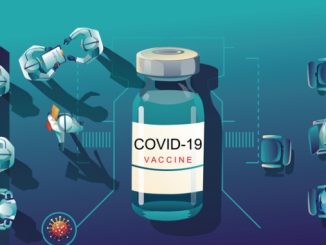
As reported by BBC news, dialysis patient Brian Pinker, 82, has become the first person to receive the Oxford-AstraZeneca COVID-19 vaccine
The retired maintenance manager got the jab at 7:30 GMT from nurse Sam Foster at Oxford’s Churchill Hospital. More than half a million doses of the vaccine are ready for use today.
Health secretary Matt Hancock said it was a “pivotal moment” in the UK’s fight against the virus, as vaccines will help curb infections and then allow restrictions to be lifted. But prime minister Boris Johnson warned on Monday there was “no question we will have to take tougher measures”, which will be announced in “due course”, as the UK struggles to control a new, fast-spreading variant of the virus.
On Sunday more than 50,000 new confirmed COVID cases were recorded in the UK for the sixth day running, prompting Labour to call for a third national lockdown in England. Northern Ireland and Wales currently have their own lockdowns in place and Scottish First Minister Nicola Sturgeon announced a fresh lockdown will begin in Scotland from 00:01 on Tuesday.
The rollout comes as rows continue over whether pupils should return to school with the current high levels of COVID infections.
Six hospital trusts – in Oxford, London, Sussex, Lancashire and Warwickshire – have begun administering the Oxford-AstraZeneca jab, with 530,000 doses ready for use. Most other available doses will be sent to hundreds of GP-led services and care homes across the UK later in the week, according to the Department of Health and Social Care.
Mr Pinker, who has been having dialysis for kidney disease at the Churchill Hospital for a number of years, said he was “really proud” the vaccine was developed in Oxford.
“The nurses, doctors and staff today have all been brilliant and I can now really look forward to celebrating my 48th wedding anniversary with my wife Shirley later this year,” he said.
Music teacher and father-of-three Trevor Cowlett, 88, and Prof Andrew Pollard, a paediatrician working at the Oxford University Hospitals NHS Foundation Trust and lead investigator of the Oxford vaccine trial, were also among the first to be vaccinated.
Chief nurse Ms Foster, who administered the first dose, told the BBC it was a “huge privilege”, saying: “Every single patient that we have vaccinated over the last couple of weeks have got their own personal stories to the difference it’s going to make, so it is no different this morning.”
Speaking during a visit to London’s Chase Farm Hospital, to meet some of the first people to receive the Oxford vaccine, the prime minister said there were “tough, tough” weeks to come.
There will now be a “massive ramp-up” in vaccination numbers “in the weeks ahead”, Johnson said, and the number of vaccine doses will amount to “tens of millions by the end of March”.
Asked when the government will be able to vaccinate two million people a week, Johnson said the government will give more details “in the next few days… as soon as we have better numbers to give”.
Hancock told BBC Breakfast the Oxford vaccine rollout was a “pivotal moment” in the fight against coronavirus, saying: “It’s going to be a tough few weeks ahead, but this is the way out.”
Asked about reports potential volunteers were being deterred by the additional training and forms, Mr Hancock said they were going to “reduce the amount of bureaucracy”.
“For instance there’s one of the training programmes about how to tackle terrorism, I don’t think that’s necessary, we’re going to stop that,” he said.
However, he said this was not delaying the delivery of the vaccine, adding that the next delivery of the vaccine will be “early this week” to be “deployed next week”.
England’s chief medical officer Chris Whitty said the vaccines “give us a route out in the medium term” but warned the NHS was “under considerable and rising pressure in the short term”.


Be the first to comment